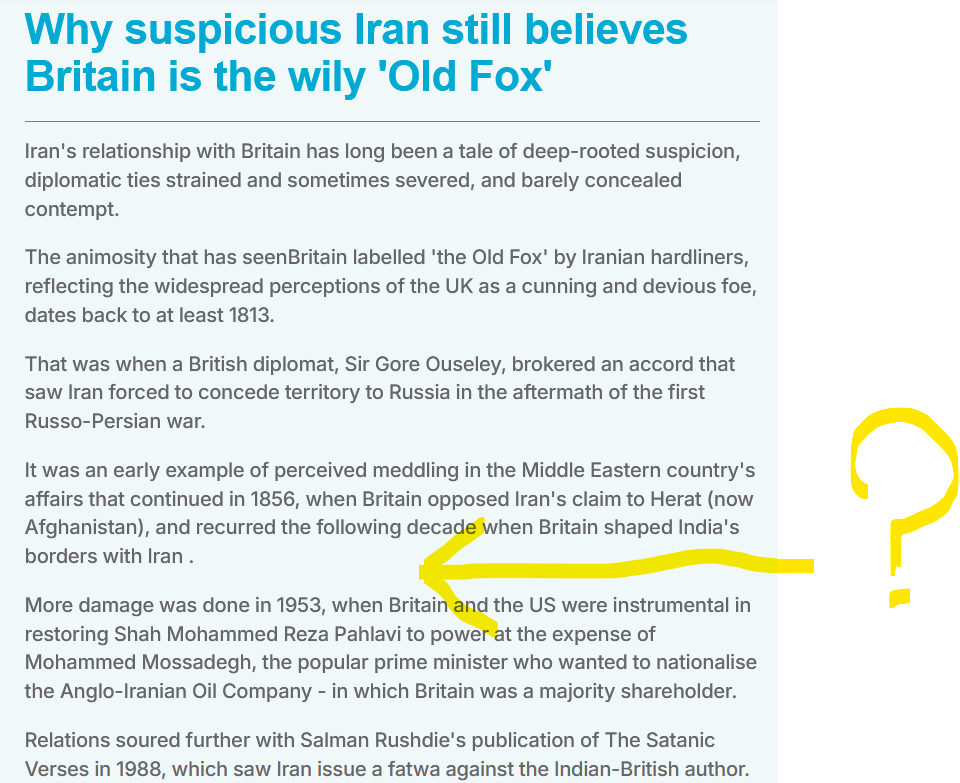The Perils of Ignorance
How the Khomeinist state and its apologists weaponize Western cluelessness
From all appearances, Craig and Lindsay Foreman seem like pleasant, openhearted English tourists. Out of a worthy sense of curiosity and interest in the world – and an avowed desire to spread positivity – last year they began an overland motorcycle trip across Eurasia, starting from their home in Spain and projected to end in Australia. The journey wound through a dozen countries, and in social media posts the couple gave glowing praise to ordinary people’s decency and hospitality. However, at the start of this year their itinerary landed them on the doorstep of an obscure entity called the ‘Islamic Republic of Iran,’ and here the red flags began to crop up. Friends on social media, and even the UK ‘Foreign Office,’ warned them repeatedly, in the strongest terms, to avoid traveling to this place.
Ignoring all pleas, the Foremans sped their motorcycles past the ominous metaphorical ‘danger’ signs by the highway, and into the Khomeinist dictatorship. At first, everything went fine. They’d obtained their tourist visas, along with the North Korea-style ‘guide’ now required for all Western visitors to Iran. From the Armenian border they made steady progress through the country’s northwest, and into Tehran. Along the way Lindsay Foreman, a professional life coach, continued with her project of interviewing people they met on the question of what it means to live a ‘good life.’ She’d intended to present some of her findings at a conference in Brisbane, Australia at the end of their grand tour.
By January 3rd, the couple was already in the central, heritage-filled city of Isfahan. Rather than share a cliched selfie from the famous Naqsh-e-Jahan Square, though, Lindsay instead posted on Facebook about a new interview she’d conducted at a local Islamic school, the Madreseh Naseriyeh. “Two Hearts, One Gesture,” she wrote, followed by a heart emoji. “This simple act – placing a hand on the heart – transcends words, cultures, and languages. It’s a universal expression of respect, gratitude, and connection.” After some explanation of the uses for the word for ‘heart’ in Persian and Arabic, and more encomiums to humanity’s shared values, she attached a photo of herself with a man she described as a “kind and thoughtful mullah,” without providing his name.
The picture itself is illuminating in a number ways. Ms. Foreman sits across from the turbaned cleric with a warm smile and her hands folded over her chest. She’s wearing the mandatory headscarf, but pushed so far back on her head – exposing her ‘forbidden’ hair to this holy man – that women in Iran have been tortured and killed over less. The mullah returns her hand-on-heart gesture with a simpering look and his eyes piously cast to the ground – perhaps a concession to this clueless foreigner – while between them sits that symbol of everything that’s gone wrong for Iran’s people in the last half-century: the ‘Islamic Republic’ flag. Lindsay Foreman may have had no idea of it, but the man sitting opposite her would not be in his clerical position unless he fully backed a totalitarian regime that’s run more as a criminal enterprise than anything resembling a government. The image is stark and sickening: a veritable lamb sitting down for tea with a wolf.
It’s all very well to trust to the kindness of strangers and hospitality in the Middle East – and most regions of the world for that matter. Meeting ordinary people, nine times out of ten you won’t be disappointed. What’s less forgivable is to disregard, to the point of self-destruction, all evidence that you’re about to enter one of the world’s most notorious and brutal dictatorships. To laugh all that off and simply plunge ahead is, in its way, an insult to all the citizens who have given their lives and freedom to liberate Iran from the Khomeinist mafia, and to be the voice to the world of those who can’t escape. The Foremans might protest that they meant no such offense, but whatever their intentions, the result is the same. Their cavalier ignorance has now made them pawns in the IRI’s international extortion racket.
Craig and Lindsay Foreman were, inevitably, arrested and held prisoner. The gang bosses produced the usual excuse – espionage! – and likely rubbed their hands in glee that a couple of grade-A hostages had fallen right into their lap. With relations between the Khomeinist junta and US allies like Britain in a constant ebb and flow of strung-along negotiation and stalemate, it’s anybody’s guess when the hapless Foremans will see their friends and family again.
It’s hard to excuse the new British hostages’ lack of judgment about Iran’s current situation. What’s easier to understand, however, is the extent to which foreigners have been comprehensively kept in the dark on key parts of Iran’s modern history, which have an outsized bearing on today’s problems. This is well illustrated by a story the UK tabloid ‘Daily Mail’ ran on the Foremans. Along with covering the tourists’ misfortunes, the piece contains an ‘information’ panel titled “Why suspicious Iran still believes Britain is the wily ‘Old Fox’.” The panel features a rough timeline of disputes between Iran and the UK government since the early 19th Century, including the British-brokered concessions the Qajar monarchy was compelled to make to the Russian Empire, ceding Iranian territory in the Caucuses (modern Armenia and Azerbaijan). The section also mentions the Anglo-Persian War of 1856-57, although its name is omitted, and it leaves out the fact that British and Indian troops invaded Iran to force the Qajars to give up their claim on the province of Herat (now in Afghanistan). The Daily Mail then skips forward to 1953 and the notorious British role in the overthrow of Iranian Prime Minister Mossadegh.
Something rather significant is missing from this timeline, though. It happens to be the arguable turning point in Iran’s 20th Century history: a disaster the country still doesn’t commemorate, and has yet to fully recover from. Readers may guess it’s Khomeini’s hijacking of the 1979 revolution, and while that was certainly disastrous, they’d be incorrect. In fact, it was the Anglo-Soviet Invasion of 1941. A now little-known campaign of World War II, in August of that year the British-Indian and Russian-Soviet empires launched a full-scale attack from multiple fronts, and occupied Iran with hundreds of thousands of troops in an unprovoked and illegal war of aggression. Iran was ruled at the time by the dictator Reza Khan/Pahlavi, and the invasion forced him out of power in favor of his son, Mohammad Reza, who would remain until his own Western-aided overthrow in 1979. The Anglo-Russian occupation itself was imposed until 1946, forcing Iranians to endure starvation, autocratic military rule, and catastrophic damage to their economy.
That the Daily Mail would omit mentioning this event is telling, and consistent with its role as a mouthpiece for the British security state. It’s long been our view that propaganda is nine tenths omission, and here the Mail furnishes a perfect example of that. Given the tabloid’s rabidly anti-Russia stance on the war in the Ukraine, it’s hardly surprising they would want to airbrush out ‘heroic’ Britain's collaboration with the Russian-dominated Soviet Union. Not only that, but in a war of the type the Nuremberg Trials defined as the ‘ultimate international crime.’ Yet some historical wrongs are too glaring to hide, and with any luck a free Iran will at last properly deal with the legacy of Britain and Russia’s perfidious actions.
The British deep state’s interference with Iran in fact remains more widespread, and insidious, than many might think. What may surprise readers most is that this covert influence seems not to be in favor of regime change, but in fact in support of the Khamenei dictatorship. A recent incident from Sweden demonstrates how.
Rouzbeh Parsi is an Iranian-Swedish citizen and academic, who currently serves as the director of the Middle East Program at the ‘Swedish Institute of International Affairs.’ This organization is a non-profit ‘think tank’ that, although notionally independent, receives funding from the Swedish government. Parsi himself claims to be an independent scholar, but was recently exposed by a Swedish channel ‘TV4’ investigation to have had direct ties to the Islamic Republic’s foreign ministry, via a lobbying network known as the ‘Iranian Experts Initiative.’ This group was founded in 2013 in the run-up to the negotiation of Obama’s JCPOA or ‘Iran Nuclear Deal,’ and aimed to use friendly academics to promote the Khamenei dictatorship’s talking points in the Western public sphere. Parsi, along with his brother, Trita Parsi, secretly liaised with agents of then IRI Foreign Minister Javad Zarif (currently a Vice President in the Pezeshkian cabinet), and produced a steady stream of articles, books and ‘Iran expert’ media appearances to advance pro-dictatorship talking points. Trita Parsi, incidentally, himself founded the IRI-lobbyist think-tank ‘NIAC’ (‘National Iranian American Council’) for the same purpose in Washington, DC.
In the aftermath of the IRI’s downing of Ukrainian Airlines’ Flight 752, and its brutal suppression of the ‘Woman, Life, Freedom’ protests, such collaboration with the dictatorship is impossible to justify to the Swedish public. Rouzbeh Parsi is now facing calls for his dismissal, especially from Swedish politicians of Iranian origin. Where this controversy gets even more eye-opening, and leads back to the British government, is in Mr. Parsi’s own comments in his defense. He claims he was never an agent of the IRI, despite leaked emails showing that ‘Iran Expert Initiative’ members collaborated extensively with the regime through ghostwriting and in-depth consultation. Parsi instead asserts that as a scholar he is free to interact with any government “and can therefore speak to everyone.” His defense of course does not address why he, and other participants, felt the need to keep these contacts with the IRI Foreign Ministry a secret.
His most slippery and technicality-ridden justification of all, however, is that he was acting at the time not on behalf of the Swedish Institute, but instead with funding from none other than the British Foreign Office. This revelation, though swiftly denied by the UK government, is entirely consistent with the shadowy network of think-tank and NGO influence that links the deep states of so many Western nations to the very regimes they publicly criticize to no end, but take no substantive action against. With one foot in both camps, it seems, Parsi exchanged congratulatory emails with the Iran Experts Initiative coordinator after the JCPOA was finalized, and was named in their leaked internal communications as among the IRI government’s “friends.”
As to what sort of quid-pro-quo the British Foreign Office was receiving for funding Parsi’s work, for now we can only speculate. Perhaps a future Nigel Farage-led Reform UK government will shine a light on such corrupt dealings, as Donald Trump’s DOGE investigators are doing for the American public. But the real lesson from all this is that for years, agents and collaborators with the Islamic Republic enjoyed privileged status in Western media and scholarship, continually spinning events and perspectives to align with the dictatorship they secretly served. They exploited people’s ignorance of Iran for these purposes, but our hope is that a more discerning general public is now waking up to their skulduggery, and becoming harder to manipulate. Whether it’s seeing through the IRI’s hackneyed excuses, filling in the gaps of propagandist spin, or clearly naming the Khomeinist terror oppressing Iranians, those able to spot and denounce the dictatorship’s shadow servants are growing in knowledge, and numbers, every day.
As for Craig and Lindsay Foreman, we can only hope observers will take a lesson from their fate – one which sadly repeats that of so many innocent Iranians who garner less worldwide attention.






